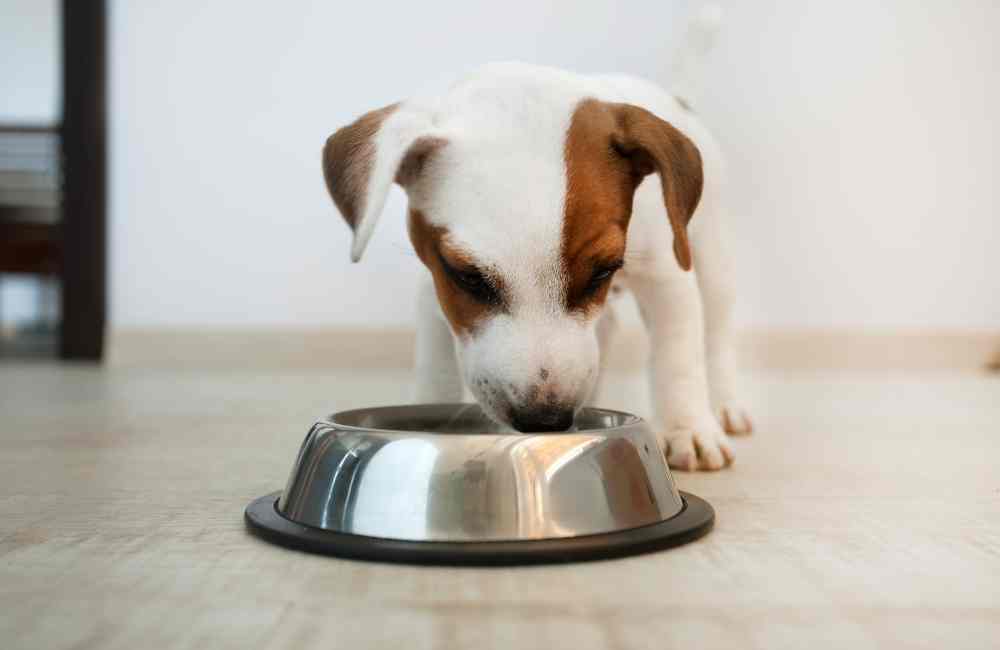Who doesn’t love puppies? They’re cute, cuddly, and oh-so funny, inspiring laughs and smiles wherever they go. However, while it’s common (and understandable) to think that bringing a puppy home is nothing but fun, it’s not always as easy as we think it will be.
Puppies need the right amount of food, water, sleep and play to grow up into healthy and happy dogs, and though we love them, we don’t always know what’s best for our new pup when we first bring them home.
When getting to know your new puppy, you’ll likely notice that they sleep — and probably more than you thought possible. This is because puppies grow fast, and their little bodies do most of this important work when they’re in a deep sleep.
But when one of their many naps run into mealtime, then what should we do? We’ve all heard the phrase “let sleeping dogs lie,” but does that apply when they need to eat as frequently as puppies do?
If you’re stuck between waking your puppy to eat or letting him dream away, you’re not alone! Many new puppy owners are wondering the same thing as you are, so you’re in the right place.
I’ve listed a few things to consider when you don’t know if you should wake your puppy to eat or not, as well as some explanations for why it might be a good idea at some time, but not so much at other times.
Should I Wake My Puppy to Eat?
The short answer? Maybe. The long answer? Again, maybe — but keep reading. It’s hard to give a yes or no answer for this question because it depends on several factors. Your puppy’s age, the time of day, how long they’ve gone without food, and their general health all predict whether it might be a good idea to wake them for their meal (or not).
There are times when it’s ok to let them hit snooze for a little while longer, and other times when food is more important than sleep. Read on for some more detailed examples, along with a few helpful questions you can ask yourself:
Do You Have Puppy on a Schedule?
One of the main reasons new puppy owners run into trouble is because they don’t create a schedule. Puppies require a certain amount of food, water, play, potty breaks, and of course, sleep.
The more consistent you are with all of these, the better off they — and you — will be. Not only will it help you to work other important tasks into your day (remember your life before you got a puppy?), but it also helps them to learn what to expect from you.
While it’s great fun to simply play and cuddle with your puppy all day, not taking things like feeding times, nap times, play time and potty breaks into account can lead to all sorts of results you don’t want!
Let’s put it this way: it’s far easier to enjoy your new puppy when they eat, sleep, play and potty on a predictable schedule than wondering when they’ll soil in the house (again), when they’ll finally fall asleep, and when they’re hungry!
As a basic rule of thumb — and this will change as puppy gets older — your new puppy needs anywhere from 18 to 20 hours of sleep a day, along with 3 to 4 mealtimes. This can easily be scheduled so that puppy doesn’t have her naps when it’s time to eat, so that she sleeps enough as well as getting her important calories.
Scheduling her meals, potty breaks, naps, and play time (not necessarily in that order) will help you immensely — and usually negate the need for waking her from her much needed sleep!
How Old is Your Puppy?
When asking yourself if you should wake puppy to eat, it’s important to think about her age. Up to the age of about 10 weeks puppies need to eat 3 to 4 times a day, so if she’s that young and will be missing one of her meals, it’s probably a good idea.
Chances are, if she really needs the sleep she’ll go right back to napping after her meal anyway (but don’t forget to take her out to potty first)!
As they get older, puppies eat and sleep less and less frequently, and eventually will only need two meals a day by the age of around 6 months.
However, consider your individual pup and the recommendations of your vet as different sizes and breeds can need more or less feedings, as well as those with certain medical conditions (if your pup was underweight, for example).
If your 8 to 10-week-old pup’s daytime nap causes them to go longer than 4 or 5 hours without eating, it’s a good idea to wake them up for food. During the night they can go longer as this is when they’ll sleep the longest, but you can bet that they’ll wake up ready for breakfast!
Having said that, you’ll likely have to wake up with them at least once a night for the first few months anyway. Love potty training yet?
What Time of Day is it?
Considering the time of day is important when you’re wondering if you should wake puppy to eat. This is especially true if it’s his last meal of the day, as young puppies shouldn’t go all night without their dinner.
They can easily become malnourished and develop health problems if they’re not eating frequently enough, plus you don’t want him waking you up at 3am because he missed his dinner and is now starving!
If it’s his morning or midday meal, you have a little wiggle room here; but don’t wait too long. If you give one meal too much later than usual it throws off the rest of the day’s schedule, changing his appetite for the next meal.
This will only leave you flustered and puppy not knowing what to expect, which isn’t good for anyone! Puppies need regular meals with sufficient calories for their age and body weight to thrive; yet another reason a schedule is so handy.
The good thing about this is, once you’ve established a regular routine, naps, feeding, play time and potty breaks will all become predictable — to both you and to puppy. Pretty soon you’ll find that your clever little puppy will adapt to his new routine, and eventually his tummy will tell him when it’s time to eat — whether he’s sleeping or not.
When to Call the Vet
As always, if there’s ever a time where you’re worried or simply don’t know what to do, a call to your vet can be very reassuring. However, there are certain times when this is a must, and it’s important to know the warning signs to watch for.
Here are some examples that warrant a prompt call to your vet:
- Puppy refuses to eat or drink at normal mealtimes when awake (once routine has been established)
- Puppy sleeps more than usual or seems lethargic when awake
- Puppy is vomiting or has diarrhea
- Puppy has a fever
All of these examples can cause — or be related to — excess sleeping, so keep an extra close eye on your puppy if you’re concerned that they’re sleeping too much. Call your vet if you’re ever in doubt; if it’s nothing to worry about at least they’ll put your mind at ease. As they say, better to be safe than sorry!


